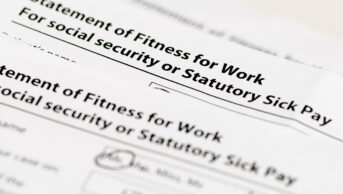
Julia Ivantsova / Shutterstock.com
Patients booking an appointment with a pharmacist at their local doctors’ surgery could become the norm in England if plans from pharmacy and GP professional bodies pay off. The joint proposal from the Royal Pharmaceutical Society (RPS) and the Royal College of General Practitioners (RCGP) offers clinical pharmacists as a solution to the workforce crisis in general practice.
The concept is appealing. The proposal recognises that pharmacists’ clinical skills can be put to good use in the general practice setting. This has been the focus of a recent campaign by the RPS’s English Pharmacy Board.
Initiatives that expand the range of pharmacy career options will be welcomed by registered pharmacists and pharmacy students who are concerned about the impending oversupply of pharmacists. The UK government announced in autumn 2014 that it would not place controls on the number of places in pharmacy degree programmes. The result — according to analyses by the Centre for Workforce Intelligence, which advises the government on workforce requirements for health and social care in England — is an expected excess of some 11,000–19,000 pharmacists by 2040.
General practice has the opposite, but more immediate, problem. The RCGP has estimated a current shortfall of around 8,000 family doctors, with the number of unfilled GP positions having quadrupled between 2010 and 2013.
Not a new concept
There are already many examples of pharmacists working in general practices in the UK, some directly employed, others part of medicines management teams in primary care organisations like clinical commissioning groups; so the idea is not new. What the current proposals address is the need for scale — for so-called ‘practice pharmacists’ to be viewed as an integral part of GP teams, rather than a desirable extra.
Both the RCGP and the RPS have called for the plan to proceed with pace. Some large general practices will have the budget to employ a pharmacist directly; others will struggle to find the money. RCGP chair Maureen Baker revealed at a King’s Fund event on 17 March 2015, when the proposals were launched, that discussions with NHS England are under way, which could see some financial support for the posts through an existing ‘Building the workforce’ plan to address the capacity crisis in general practice. This would help create momentum for the initiative.
NHS England, however, is taking a cautious stance. Its deputy chief pharmaceutical officer, Bruce Warner, has suggested that the necessary skills and training required by pharmacists to undertake the role would need to be investigated. It remains to be seen whether this has the effect of delaying a funding commitment from the national commissioning board.
Overcautious approach
Introducing training requirements for pharmacists in general practice could hinder a widespread roll-out of the proposal. Moreover, being overly prescriptive about skills and experience may make it difficult for general practices to respond to local needs. To suggest that recruitment of practice pharmacists is somehow risky fails to recognise those pharmacists who have forged roles in GP surgeries over the past decade and made the current initiative a realistic proposition.
The RCGP has expressed no doubts about the clinical capabilities of pharmacists, which is in itself an important milestone for pharmacy. In 2005, the royal college did raise concerns about the extension of prescribing rights to pharmacists and suggested that expanding the role of pharmacists might undermine the medical degree and remove the central role of the GP.
General practices will be in the best position to understand the needs of their patients, identify which type of clinical support is needed and where to deploy additional capacity. They need no advice from NHS England to design a relevant job description and recruit a pharmacist with the appropriate experience.
Visions aligned
Practice pharmacists can help relieve GP workload, but they should not just be seen as budget doctors; the current plans recognise that judicious use of pharmacists’ skills bring real benefits to patient care. For example, a pharmacist can manage the GP surgery’s repeat prescription service and act as a contact for community pharmacists and patients. They can see patients with chronic diseases whose condition and medicines need ongoing monitoring. Patients with complex regimens can book an appointment with the pharmacist to have those medicines reviewed — equipped with a prescribing qualification and in collaboration with the patient a pharmacist can cancel unnecessary medicines, make changes to doses and switch drugs that may be causing side effects.
The RPS has confirmed there is no set view on how GP practices can get this pharmaceutical support. Certainly they can employ their very own pharmacist, but they could also contract a local community pharmacy to provide clinical services or have individual pharmacists doing sessional work. Accordingly, community pharmacists should not see this development as a threat. Indeed, the collaboration of GP and pharmacy professional bodies bodes well for community pharmacy’s ambitions to be well integrated into primary care pathways.
The shortage of GPs, and practice nurses in some areas, is leaving people waiting more than a week for an appointment in many parts of England, where the government is also trying to boost access to GPs in the evenings and at weekends. Employing practice pharmacists, with the full support of the RPS and RCGP, puts the professions on a common path — one that addresses the needs of patients rather than protectionist professional allegiances.
It is good to see the valuable skillset of pharmacists recognised as a strength by GPs. More importantly, however, this is a pragmatic plan that will better equip general practice to meet the increasing demands on its already limited resources.


